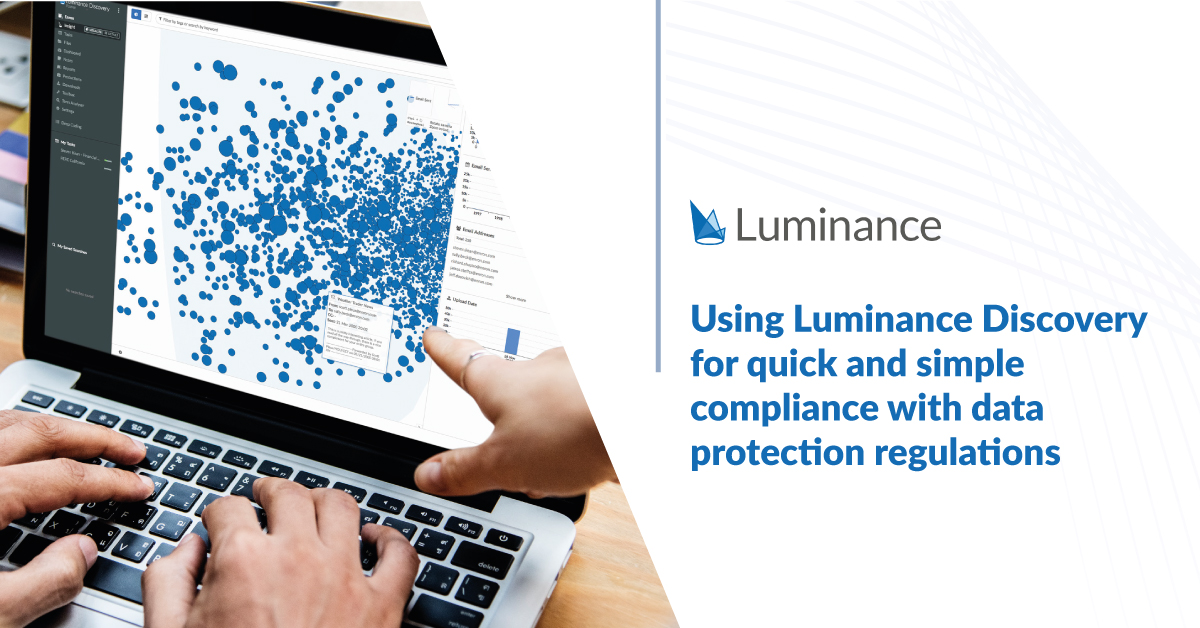
Blog
Using Luminance Discovery for compliance with data protection laws
24 August 2020 | Luminance
In recent years, a series of data protection regulations have been enacted which have created significant new obligations for organisations that handle personal data. Starting with the European Union’s General Data Protection Regulation (GDPR) which came into force in 2018 and more recently with the California Consumer Privacy Act (CCPA), these data privacy regulations look set to become a new international standard. Under the regulations, organisations have an obligation to deliver all personal data that they hold regarding an individual to that individual when requested. The tight deadlines, significant penalties for non-compliance and the difficulty of identifying all the relevant data have made these requests, known under GDPR as Data Subject Access Requests (DSARs), into challenging obligations for lawyers. At a recent Luminance webinar, Legal Product Expert Olivia Goodey, spoke about how Luminance Discovery's AI technology can help lawyers meet these obligations fully, whilst simultaneously using fewer resources and saving vast time and cost.
Reducing the burden of personal data requests
In Olivia’s experience, the impact of GDPR and CCPA has been considerable as “these regulations have demanded substantial changes in the way businesses handle personal data”. Further, the impact may soon be felt in other countries since “it seems likely there were will be further growth of these regulations over the coming months and years”. The obligations to hand over personal data are often expensive and time consuming, whether handled by in-house legal teams or external counsel. Trawling through large data sets manually to find the relevant information is not only hugely inefficient, it risks failing to meet the strict deadlines that data privacy regulations impose and thereby incurring substantial fines. In Olivia’s view, “every business needs a plan about how to handle personal data requests, even if they are not yet affected by the legislation”.
To empower lawyers in an increasingly complex and unpredictable legal environment, Luminance has created the Legal Inference Transformation Engine (LITE), a unique blend of cutting edge supervised and unsupervised machine learning developed by mathematicians from Cambridge University which can read and form an understanding of all documents within a dataset. Luminance enhances lawyers’ review, allowing them to cut through large data sets to rapidly identify key documents pertinent to the matter at hand. For lawyers aiming to minimise the time and cost required to complete a personal data request this is a transformational technology.
Minimising the cost of new regulations
Reducing the cost entailed in personal data requests is a key priority for lawyers, particularly in the difficult economic environment created by the Coronavirus pandemic. There are no financial incentives for the successful completion of such requests beyond the avoidance of fines. As Olivia explained, “minimising the high costs involved in delivering personal data is vital for every business.” For law firms too, it is extremely challenging to make work on DSARs and similar projects economical using manual methods.
Burness Paull, a top tier Scottish law firm, recently faced this challenge when they were instructed by a long-time client after having received a DSAR from a former employee of their client. Even though the firm had never used Luminance before, they were able to cull the dataset of nearly 6,000 documents by almost 90% in just five minutes, allowing to focus their review on the relevant data and meet the GDPR imposed deadline. These huge time savings meant not only that the deadline was met, but that these resulted in significant cost-savings for the firm who went on to use Luminance on all upcoming DSARs. Using Luminance, lawyers are empowered to meet the obligations of new data protection regulations while dramatically reducing costs and the time-taken.